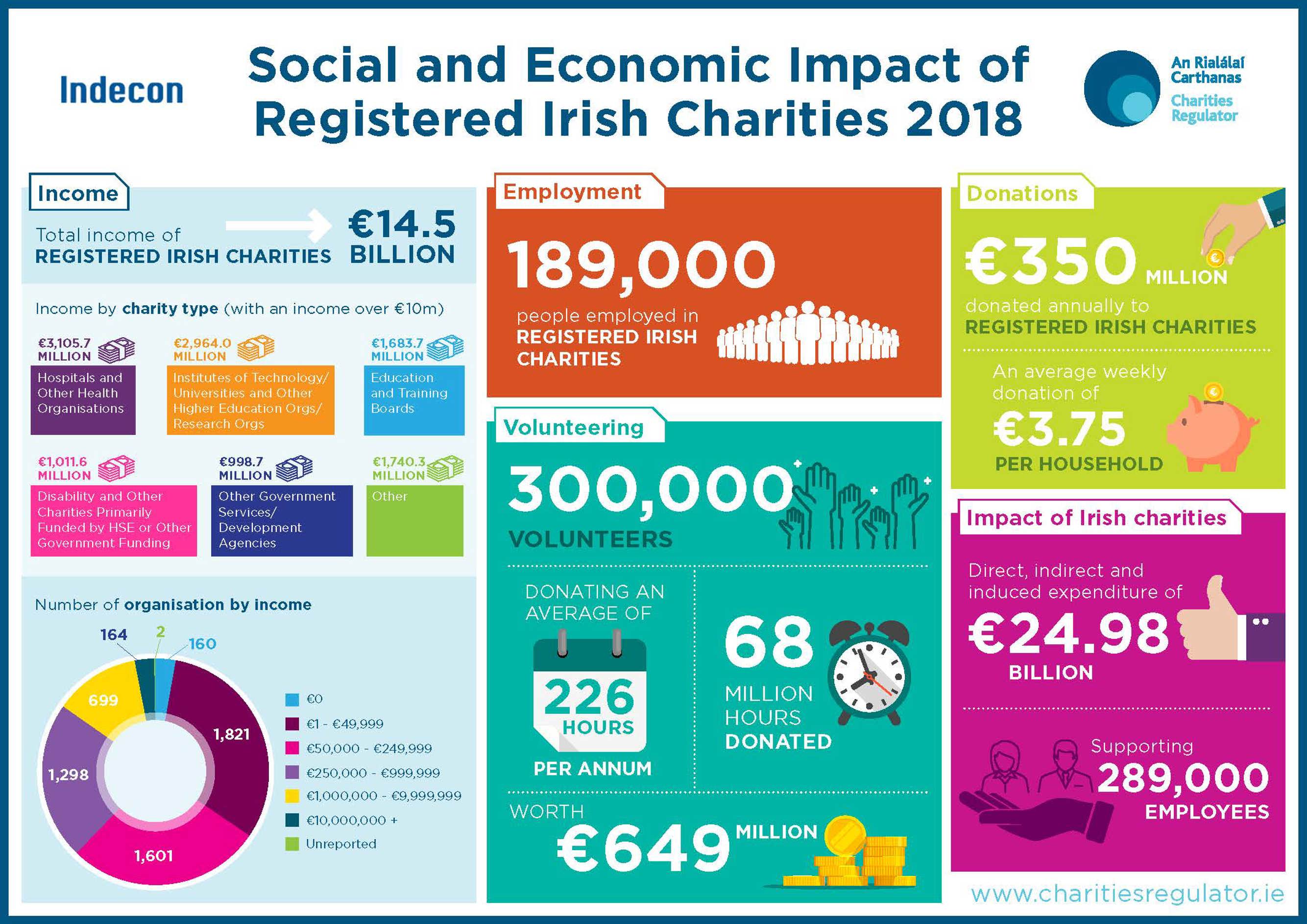Report shows the huge diversity among Irish charities
Registered Irish charities have an income of €14.5 billion, directly employ 189,000 people and are supported by 300,000 volunteers, according to research on the social and economic impact of charities in Ireland, published today.
The report by Indecon International Economic Consultants, commissioned by the Charities Regulator, shows that registered Irish charities have a direct, indirect and induced* expenditure of €24.98 billion and support 289,000 employees.
Indecon’s analysis uses data from the Register of Charities at the end of 2017, including information from annual reports provided to the Charities Regulator. Financial information regarding 5,746 charities was analysed as well as data from the Central Statistics Office.
"In addition to highlighting the significant economic and social impact which charities are making in communities across Ireland and globally, the report highlights the wide diversity of organisations which are registered as charities in Ireland,"
Charities Regulator Chief Executive John Farrelly said.
"At one end of the scale there are large hospitals and universities with budgets funded by the Exchequer, extending to hundreds of millions of Euro, and hundreds of paid staff. Many of these are large charities engaged in delivering critical health, education and social services.
"At the other end of the scale, there are completely volunteer-led organisations, providing services at community level, with small budgets."
The research shows that the Government and public bodies are the largest source of income for registered charities accounting for more than half the total funding (€7.7 billion).
Volunteers are also an important resource for charities, with the 300,000 volunteers donating 67.9 million hours (an average of 226 hours annually per volunteer). Based on the minimum wage, this is worth €649 million per year.
The report was launched today (July 25) by the Minister of State at the Department of Rural and Community Development, Seán Kyne.
He said:
"Charities have a huge social and economic impact
"While we have known this for a long time, this very valuable report allows us to talk about charitable organisations and the broader sector with some degree of precision.
"The scope of the different challenges and opportunities is thus becoming clearer, and Indecon’s report outlines further areas that we might explore in more depth, for example, the particular focus of charitable organisations and employment levels in charities. This research and gathering of data is critical in terms of informing decision making and policy."
The report analyses registered charities under a number of categories. Some of the headline findings are:
Income
- €4.5 billion of income was reported by organisations on the Register of Charities. Indecon estimates that if account is taken of organisations that did not report their financial data, this figure could rise to €6 billion (equal to 5.8% of GDP);
- Just 2.8% of charities reported income of over €0 million, but they accounted for 79.3% of the total income of registered charities. Hospitals and other health organisations (€.1 billion) and higher education and research organisations (just under € billion) report the highest income within the sub-sectors used in the report;
- In contrast, over half of registered charities had an income of less than €50,000.
Employment
- Indecon estimates there are 188,714 people employed in charitable organisations;
- The majority of these (79%) are employed by charities with reported income of over €0 million. Over 55,000 are estimated to work in hospital and other healthcare organisations, with 38,000 in higher education and research organisations;
- More than half (53%) of charity employees are in registered charities supported by Government expenditure.
Donations
- Indecon’s estimate for household charitable donations in 2018 is €50 million;
- The average weekly household donation in 2015 was €.75.
The Indecon report is the first piece of research commissioned by the Charities Regulator as part of its function to publish information concerning charities. Mr Farrelly said the report’s findings would assist the Regulator in its work to monitor and regulate charities in a proportionate manner, and feed into the creation of its next strategic plan.
"The research will also help donors, beneficiaries and the public to broaden and deepen their understanding of the role of charities in modern Ireland," he said. The Charities Regulator also hopes the report will facilitate the development of evidence-based public policy to support charities in Ireland.
The report notes that its findings have potentially important implications which should be considered by the Charities Regulator and by policymakers. It points to the need for:
- Infrastructures to support volunteering in registered Irish charities, particularly in the 18-34 age groups;
- Infrastructures to increase and support philanthropy and donations to Irish charities;
- Regulation which recognises the diversity of registered Irish charities. It needs to be particularly sensitive to the large number of volunteer-led, low income and grassroots charities.
You can download the full Report.
* Induced expenditure is the expenditure relating to the income of households who are employed in, or whose jobs are supported by, the expenditure of charitable organisations in Ireland.
For more information: email press@charitiesregulator.ie.
To see the full Infographic, click here.


